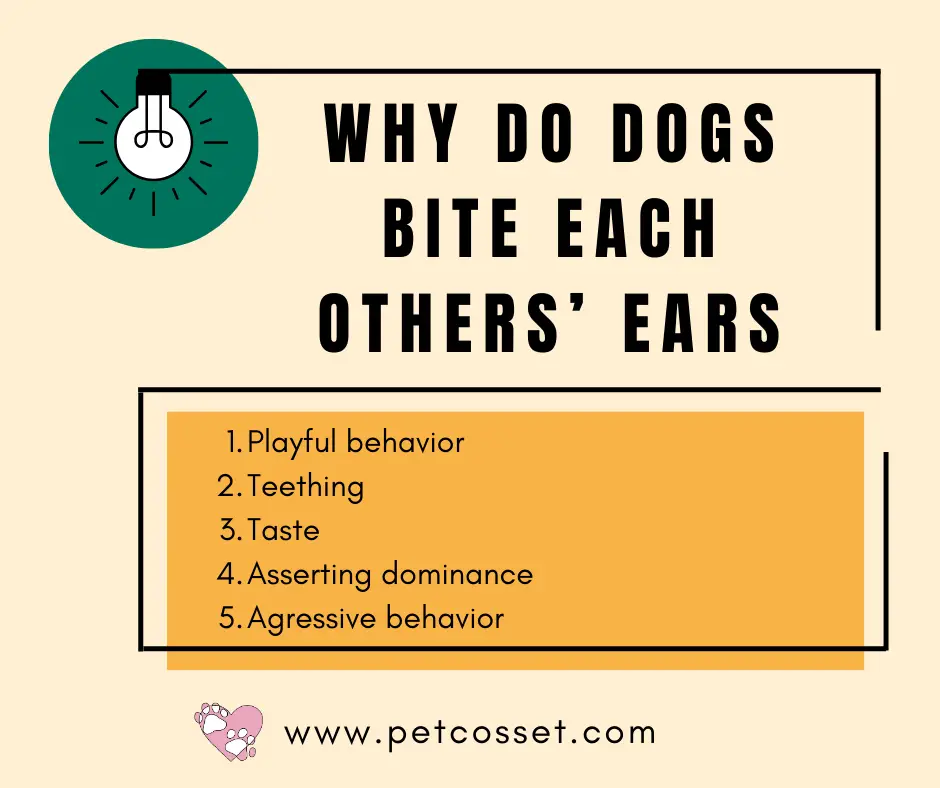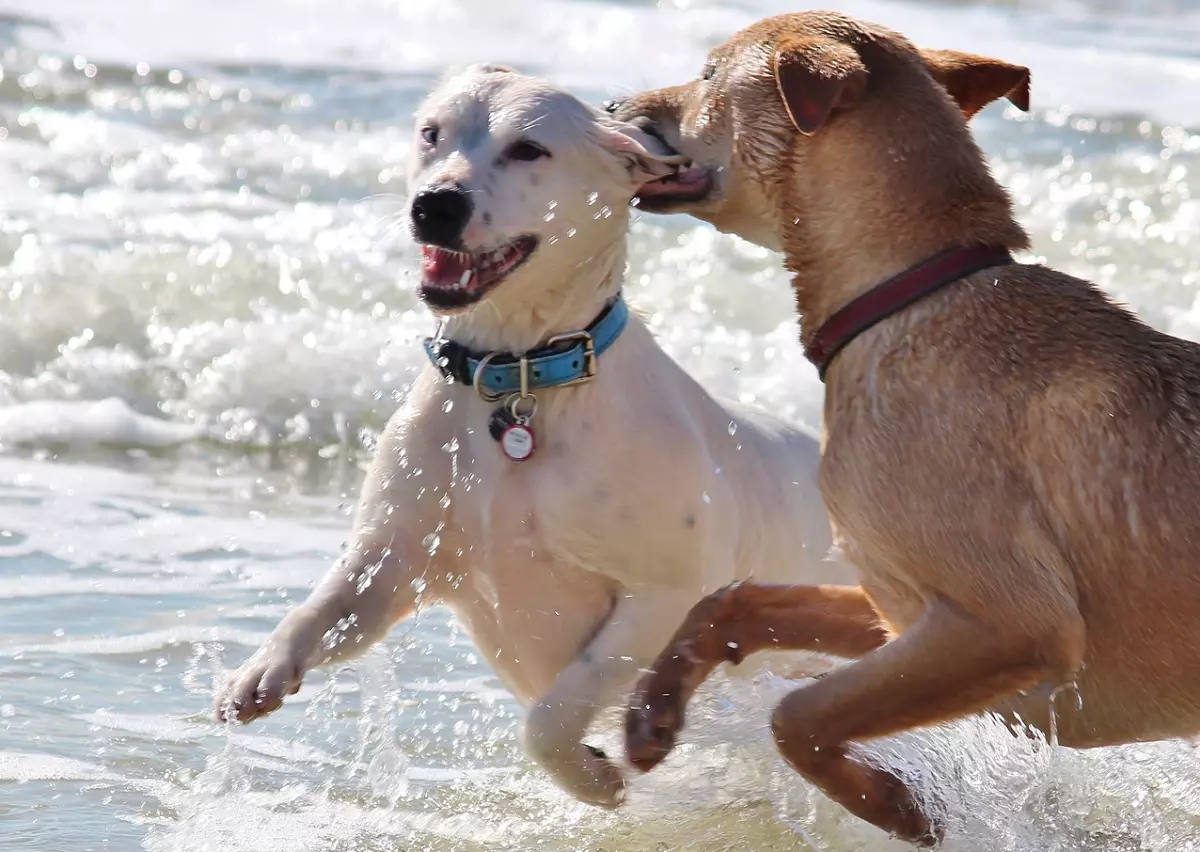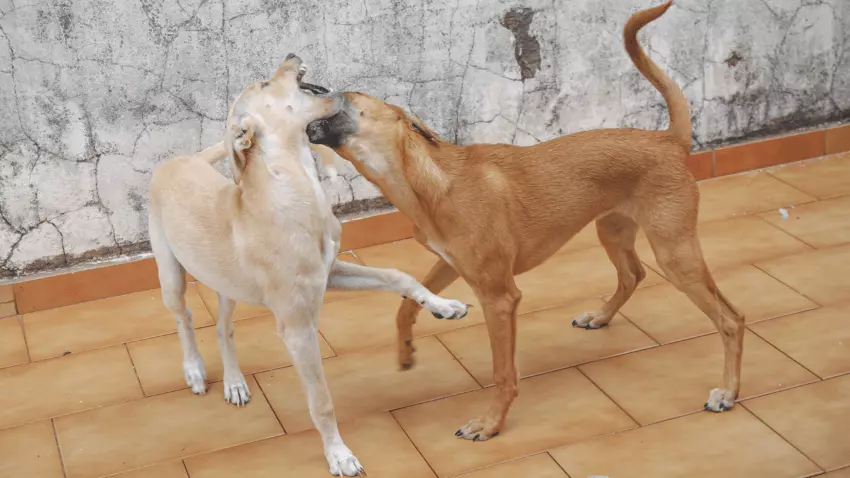What Does It Mean When A Dog Bites Another Dog’s Ear?
Dogs exhibit a wide range of behavior that you may not notice in other canines. One of which is nibbling on another dog’s ears. So what does it mean when a dog bites another dog’s ear? Most of the time, it’s a case of rough play or a show of dominance. What you need to watch out for is if the ear-biting will become aggressive. Still, it’s best to discourage this behavior so your doggo won’t do it on other canines it plays with.
Why does my dog chew on other dogs’ ears?


Every dog is different and so are their reactions when surrounded by other canines. But if your pooch interacts by biting the ears of another dog, you should consider the following reasons: read more here can a puppy be liable for a dog bite
1. Your dog wants to play
Playful biting is very common in canines. They do this to other dogs as well as their humans. Most of the time, these playful bites are harmless and will not press into the skin or draw blood.
As a dog grows older, it learns that biting can both be a mode of defense and a way to get someone’s attention. By biting another canine’s ears, your dog might be thinking “Hey, let’s play!”.
Dogs get attracted to another canine’s ears because it’s an easy target. It’s a flappy body part that’s very easy to bite. In return, the bitten dog will retaliate with play fighting.
You have to pay close attention to this behavior since it can turn aggressive and become a full-on dogfight. As much as possible, distract your dog so it will stop biting the other canine.
2. Your dog is teething
Puppies that are less than six months old are still in the teething phase. Like humans, dogs will undergo two teething phases: the first during their first weeks and the last one between 4 to 6 months. This is to shed the baby teeth and grow the adult ones.
This process is very uncomfortable for puppies. With this, they will bite and chew to soothe their aching gums. And since dog ears are soft and accessible, don’t be surprised if your pup suddenly targets another canine’s lobes.
3. Your dog likes the taste
Another possible explanation here is that the dog likes the taste of another canine’s ears. The other dog’s ears might be salty and smelly, which draws the attention of your pooch.
Like any other reason, you should discourage your doggo from doing this. If your pooch happens to taste an aggressive canine’s ears, it might erupt into an explosive dogfight. please read here how to safely break a dog fight.
4. Your dog is asserting its dominance
Dogs nibble on another’s ears to assert their dominance. It’s their way of saying who the boss is since they have the courage and strength to bite someone’s ears. Canines can do this to humans as well.
This happens a lot if your dog is threatened by the presence of another canine. Take note that this gesture is a precursor to dogfights and can be a sign of aggression.
5. Your dog is aggressive
Lastly, biting another dog’s ear can be a sign of outright aggression. This means that your dog wants to assert its territory and defend it by starting a dogfight.
Many things can trigger this behavior, including the other dog getting near your pet’s food, toys, or bed. Some dogs will also be in protective mode if another doggo tries to get near you. please read here why does my dog leave food around the house
Aggressive ear-biting is often accompanied by bared teeth and gums, flattened ears, deep growling, and raised hackles. You should intervene as early as possible to stop the brewing dogfight. You can also call the other dog’s owner to separate the two using the wheelbarrow method.
How do I stop my dog from biting another dog’s ears?

Even though ear-biting might become an annoying habit of your dog, there’s a way to stop it. The following are some of the effective ways:
Intervene early
The moment you see your dog targeting another canine’s ear, call its name as a distraction. When the doggo comes to you, give it a reward. This will teach your dog that leaving other canines’ ears alone earns him something.
You should never tolerate ear-biting as this can progress into a bigger behavioral issue. It’s best to intervene as early as you discovered the habit.
Train the dog
Training is an integral part of curbing negative behavior in dogs. Start with basic obedience that includes commands like ‘stop’, ‘sit’, ‘down’, ‘leave it’, and name recall. All of these commands will give you more control over your doggo.
So next time your dog bites some other canine’s ears, you can command the pooch to stop the behavior. Positive reinforcement goes a long way here so make sure that you load up with tasty treats.
Divert the biting
If your pup is teething, you can stop them from biting dog ears through chew toys. These toys will help soothe their sore gums instead of seeking the chewy ears of other canines.
Make sure that you get safe chew toys that are appropriate for your dog’s size and age. For pups, softer chews are ideal to prevent damaging their sprouting teeth and young gums.
Meanwhile, older doggos can make use of tougher chew toys, especially if it’s a large, aggressive chewer.
Take note that violent punishments are no-nos when correcting a dog’s behavior. If you want to teach your dog the idea of consequence, you can put it in time out in an enclosed room for five minutes.
Make the ears unattractive
If your dog is biting your other pet’s ears, you can spray a small amount of bitter apple on its lobes. This way, your dog will taste the awful flavor once it tries to bite the ears again. It’s like weaning a baby off its binky.
Take note that you should only use safe solutions here. Avoid pepper or anything that will burn your dog’s mouth. Of course, it should also be safe for the dog whose ears are being bitten.
Why do dogs bite other dogs’ necks?

When a dog bites another canine in the neck, it can mean two things: playfulness or aggression. During rough play, the doggo will not sink its teeth on the flesh of the other canine. It will also release the canine in a few seconds so it can playfully fight back.
However, if the canine being bitten whimpers in pain, you should intervene right away. This could be an aggressive bite that will become disastrous in no time.
Why do dogs lick human ears?
Your ear might have a nice taste, which is why your dog can’t stop licking it. However, if the licking is slowly turning into nibbling, you should stop the dog right away. This might be your pet’s way of getting your attention or starting playtime. You’d never want to reward and enforce it by giving in to what the dog wants.
On the flipside, licking your ears might be your dog’s way of showing affection. While it’s not typical for canines to groom their selves, they lick their pack members as a means of affiliation.
Lastly, you should think about the last time you cleaned your ears. The oils and earwax might be too much that your dog is already sniffing it out.
Does biting your dog on the ear really work?
Some pet owners suggest that biting your dog by the ear will help establish your dominance and stop the canine’s biting habit.
However, the truth is that this weird myth doesn’t work. Aside from the mouthful of fur and nasty taste, biting your dog’s ear will only branch out to more problems.
For one, your doggo might think that you’re playing with them. In the long run, your pooch will do the same to you.
Also, biting your dog’s ear might create a tense environment whenever your pooch is around you. This might drive the dog away, something that you’d never want to happen.
Conclusion
What does it mean when a dog bites another dog’s ear? It’s usually a playful gesture, but it can also turn aggressive, depending on the dog’s behavior. Whatever it is, you should correct the habit so it won’t hurt other dogs and annoy pet owners. Take note that you should never punish your dog for it because violence will only cause more problems in the long run. Patience, consistency, and proper training are the key to fixing the problem.
